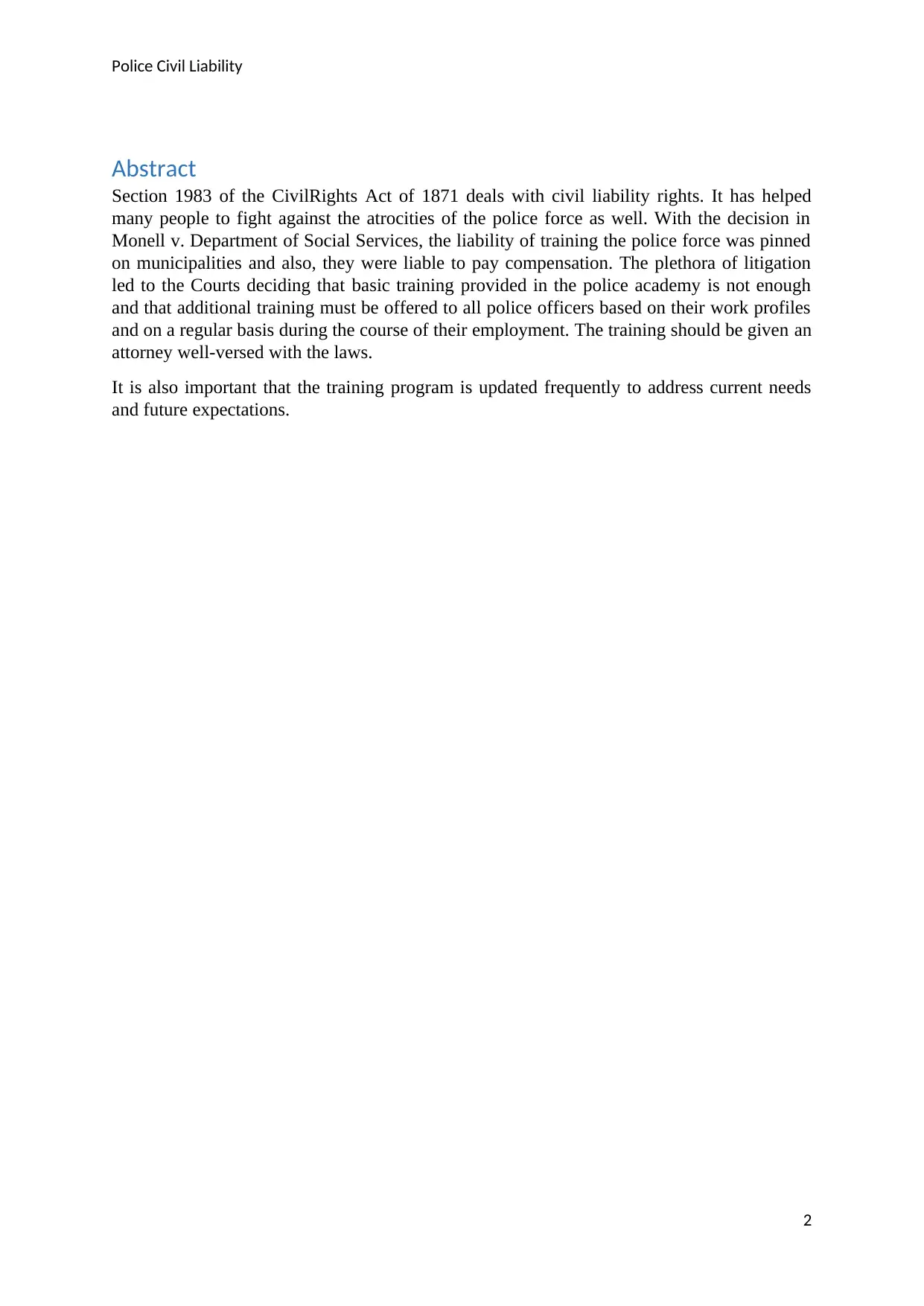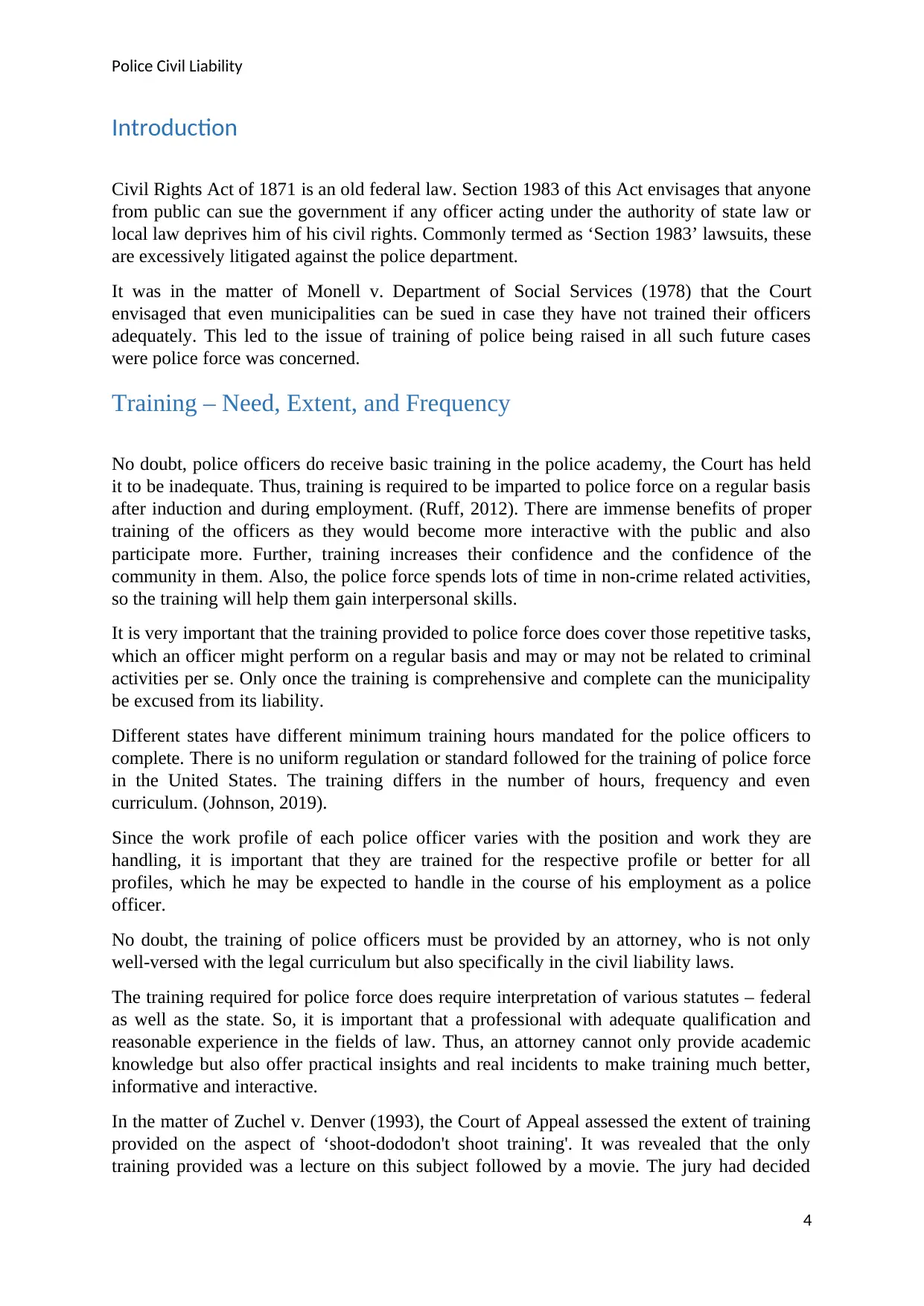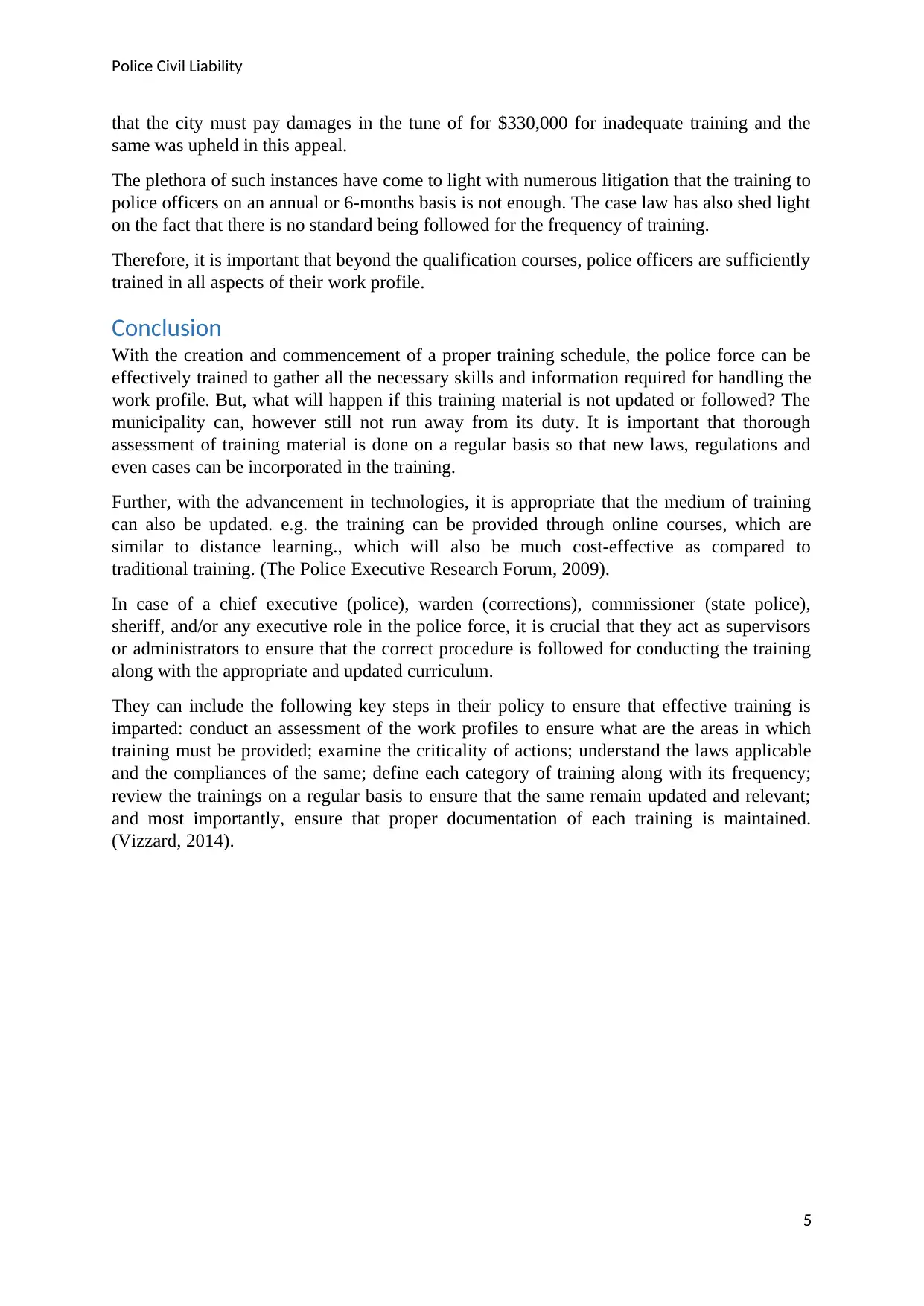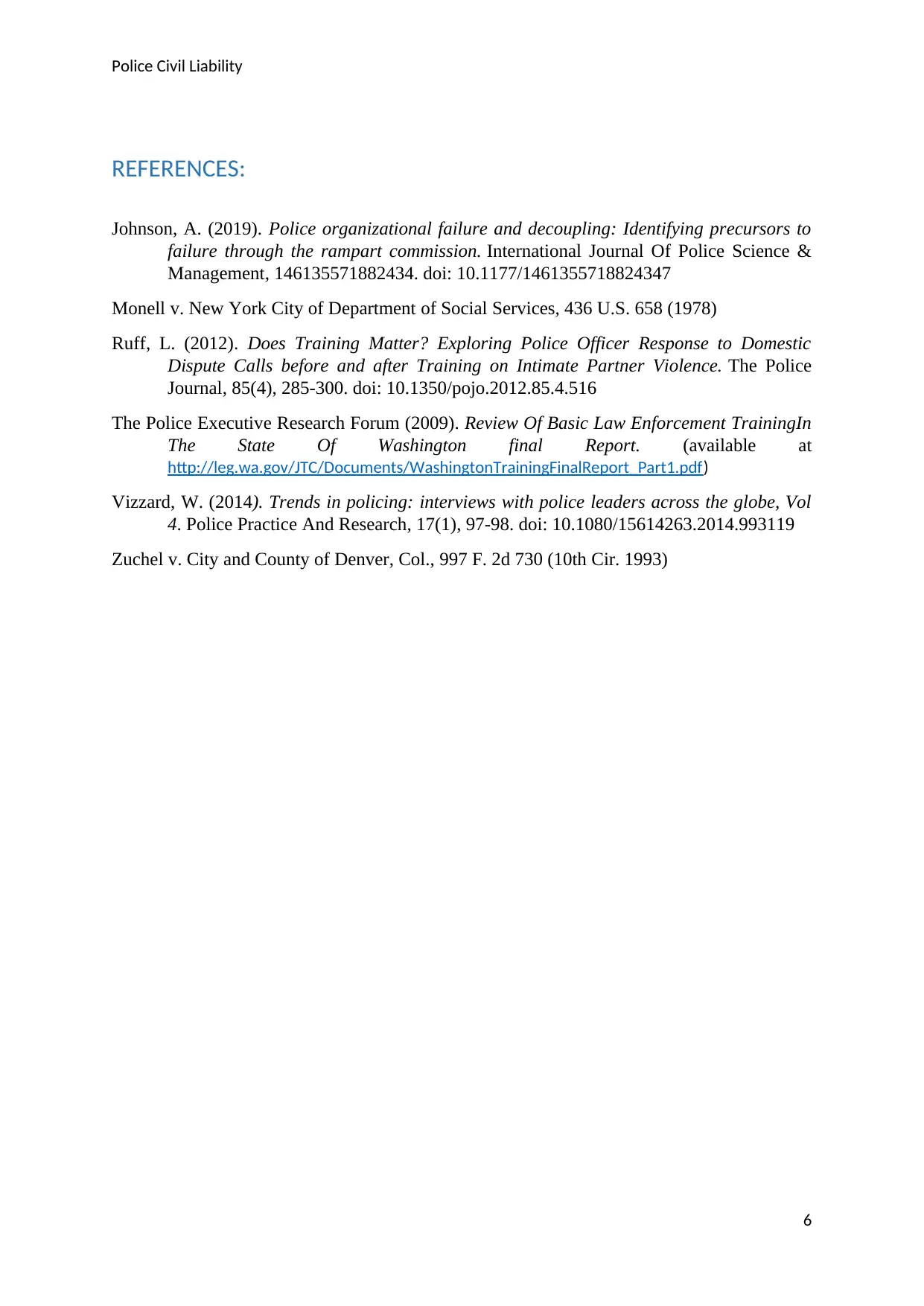Police Civil Liability
VerifiedAdded on 2023/01/17
|6
|1361
|100
AI Summary
This article discusses police civil liability and the importance of training for police officers. It explores the legal requirements and implications of inadequate training. The article also provides expert insights and recommendations for effective training.
Contribute Materials
Your contribution can guide someone’s learning journey. Share your
documents today.

Police Civil Liability
Title
Assignment Name:
Student Name:
Course Name and Number
Professor
Date
1
Title
Assignment Name:
Student Name:
Course Name and Number
Professor
Date
1
Secure Best Marks with AI Grader
Need help grading? Try our AI Grader for instant feedback on your assignments.

Police Civil Liability
Abstract
Section 1983 of the CivilRights Act of 1871 deals with civil liability rights. It has helped
many people to fight against the atrocities of the police force as well. With the decision in
Monell v. Department of Social Services, the liability of training the police force was pinned
on municipalities and also, they were liable to pay compensation. The plethora of litigation
led to the Courts deciding that basic training provided in the police academy is not enough
and that additional training must be offered to all police officers based on their work profiles
and on a regular basis during the course of their employment. The training should be given an
attorney well-versed with the laws.
It is also important that the training program is updated frequently to address current needs
and future expectations.
2
Abstract
Section 1983 of the CivilRights Act of 1871 deals with civil liability rights. It has helped
many people to fight against the atrocities of the police force as well. With the decision in
Monell v. Department of Social Services, the liability of training the police force was pinned
on municipalities and also, they were liable to pay compensation. The plethora of litigation
led to the Courts deciding that basic training provided in the police academy is not enough
and that additional training must be offered to all police officers based on their work profiles
and on a regular basis during the course of their employment. The training should be given an
attorney well-versed with the laws.
It is also important that the training program is updated frequently to address current needs
and future expectations.
2

Police Civil Liability
Table of Contents
Introduction...........................................................................................................................................4
Training – Need, Extent and Frequency................................................................................................5
Conclusion.............................................................................................................................................5
REFERENCES:.........................................................................................................................................7
3
Table of Contents
Introduction...........................................................................................................................................4
Training – Need, Extent and Frequency................................................................................................5
Conclusion.............................................................................................................................................5
REFERENCES:.........................................................................................................................................7
3

Police Civil Liability
Introduction
Civil Rights Act of 1871 is an old federal law. Section 1983 of this Act envisages that anyone
from public can sue the government if any officer acting under the authority of state law or
local law deprives him of his civil rights. Commonly termed as ‘Section 1983’ lawsuits, these
are excessively litigated against the police department.
It was in the matter of Monell v. Department of Social Services (1978) that the Court
envisaged that even municipalities can be sued in case they have not trained their officers
adequately. This led to the issue of training of police being raised in all such future cases
were police force was concerned.
Training – Need, Extent, and Frequency
No doubt, police officers do receive basic training in the police academy, the Court has held
it to be inadequate. Thus, training is required to be imparted to police force on a regular basis
after induction and during employment. (Ruff, 2012). There are immense benefits of proper
training of the officers as they would become more interactive with the public and also
participate more. Further, training increases their confidence and the confidence of the
community in them. Also, the police force spends lots of time in non-crime related activities,
so the training will help them gain interpersonal skills.
It is very important that the training provided to police force does cover those repetitive tasks,
which an officer might perform on a regular basis and may or may not be related to criminal
activities per se. Only once the training is comprehensive and complete can the municipality
be excused from its liability.
Different states have different minimum training hours mandated for the police officers to
complete. There is no uniform regulation or standard followed for the training of police force
in the United States. The training differs in the number of hours, frequency and even
curriculum. (Johnson, 2019).
Since the work profile of each police officer varies with the position and work they are
handling, it is important that they are trained for the respective profile or better for all
profiles, which he may be expected to handle in the course of his employment as a police
officer.
No doubt, the training of police officers must be provided by an attorney, who is not only
well-versed with the legal curriculum but also specifically in the civil liability laws.
The training required for police force does require interpretation of various statutes – federal
as well as the state. So, it is important that a professional with adequate qualification and
reasonable experience in the fields of law. Thus, an attorney cannot only provide academic
knowledge but also offer practical insights and real incidents to make training much better,
informative and interactive.
In the matter of Zuchel v. Denver (1993), the Court of Appeal assessed the extent of training
provided on the aspect of ‘shoot-dododon't shoot training'. It was revealed that the only
training provided was a lecture on this subject followed by a movie. The jury had decided
4
Introduction
Civil Rights Act of 1871 is an old federal law. Section 1983 of this Act envisages that anyone
from public can sue the government if any officer acting under the authority of state law or
local law deprives him of his civil rights. Commonly termed as ‘Section 1983’ lawsuits, these
are excessively litigated against the police department.
It was in the matter of Monell v. Department of Social Services (1978) that the Court
envisaged that even municipalities can be sued in case they have not trained their officers
adequately. This led to the issue of training of police being raised in all such future cases
were police force was concerned.
Training – Need, Extent, and Frequency
No doubt, police officers do receive basic training in the police academy, the Court has held
it to be inadequate. Thus, training is required to be imparted to police force on a regular basis
after induction and during employment. (Ruff, 2012). There are immense benefits of proper
training of the officers as they would become more interactive with the public and also
participate more. Further, training increases their confidence and the confidence of the
community in them. Also, the police force spends lots of time in non-crime related activities,
so the training will help them gain interpersonal skills.
It is very important that the training provided to police force does cover those repetitive tasks,
which an officer might perform on a regular basis and may or may not be related to criminal
activities per se. Only once the training is comprehensive and complete can the municipality
be excused from its liability.
Different states have different minimum training hours mandated for the police officers to
complete. There is no uniform regulation or standard followed for the training of police force
in the United States. The training differs in the number of hours, frequency and even
curriculum. (Johnson, 2019).
Since the work profile of each police officer varies with the position and work they are
handling, it is important that they are trained for the respective profile or better for all
profiles, which he may be expected to handle in the course of his employment as a police
officer.
No doubt, the training of police officers must be provided by an attorney, who is not only
well-versed with the legal curriculum but also specifically in the civil liability laws.
The training required for police force does require interpretation of various statutes – federal
as well as the state. So, it is important that a professional with adequate qualification and
reasonable experience in the fields of law. Thus, an attorney cannot only provide academic
knowledge but also offer practical insights and real incidents to make training much better,
informative and interactive.
In the matter of Zuchel v. Denver (1993), the Court of Appeal assessed the extent of training
provided on the aspect of ‘shoot-dododon't shoot training'. It was revealed that the only
training provided was a lecture on this subject followed by a movie. The jury had decided
4
Secure Best Marks with AI Grader
Need help grading? Try our AI Grader for instant feedback on your assignments.

Police Civil Liability
that the city must pay damages in the tune of for $330,000 for inadequate training and the
same was upheld in this appeal.
The plethora of such instances have come to light with numerous litigation that the training to
police officers on an annual or 6-months basis is not enough. The case law has also shed light
on the fact that there is no standard being followed for the frequency of training.
Therefore, it is important that beyond the qualification courses, police officers are sufficiently
trained in all aspects of their work profile.
Conclusion
With the creation and commencement of a proper training schedule, the police force can be
effectively trained to gather all the necessary skills and information required for handling the
work profile. But, what will happen if this training material is not updated or followed? The
municipality can, however still not run away from its duty. It is important that thorough
assessment of training material is done on a regular basis so that new laws, regulations and
even cases can be incorporated in the training.
Further, with the advancement in technologies, it is appropriate that the medium of training
can also be updated. e.g. the training can be provided through online courses, which are
similar to distance learning., which will also be much cost-effective as compared to
traditional training. (The Police Executive Research Forum, 2009).
In case of a chief executive (police), warden (corrections), commissioner (state police),
sheriff, and/or any executive role in the police force, it is crucial that they act as supervisors
or administrators to ensure that the correct procedure is followed for conducting the training
along with the appropriate and updated curriculum.
They can include the following key steps in their policy to ensure that effective training is
imparted: conduct an assessment of the work profiles to ensure what are the areas in which
training must be provided; examine the criticality of actions; understand the laws applicable
and the compliances of the same; define each category of training along with its frequency;
review the trainings on a regular basis to ensure that the same remain updated and relevant;
and most importantly, ensure that proper documentation of each training is maintained.
(Vizzard, 2014).
5
that the city must pay damages in the tune of for $330,000 for inadequate training and the
same was upheld in this appeal.
The plethora of such instances have come to light with numerous litigation that the training to
police officers on an annual or 6-months basis is not enough. The case law has also shed light
on the fact that there is no standard being followed for the frequency of training.
Therefore, it is important that beyond the qualification courses, police officers are sufficiently
trained in all aspects of their work profile.
Conclusion
With the creation and commencement of a proper training schedule, the police force can be
effectively trained to gather all the necessary skills and information required for handling the
work profile. But, what will happen if this training material is not updated or followed? The
municipality can, however still not run away from its duty. It is important that thorough
assessment of training material is done on a regular basis so that new laws, regulations and
even cases can be incorporated in the training.
Further, with the advancement in technologies, it is appropriate that the medium of training
can also be updated. e.g. the training can be provided through online courses, which are
similar to distance learning., which will also be much cost-effective as compared to
traditional training. (The Police Executive Research Forum, 2009).
In case of a chief executive (police), warden (corrections), commissioner (state police),
sheriff, and/or any executive role in the police force, it is crucial that they act as supervisors
or administrators to ensure that the correct procedure is followed for conducting the training
along with the appropriate and updated curriculum.
They can include the following key steps in their policy to ensure that effective training is
imparted: conduct an assessment of the work profiles to ensure what are the areas in which
training must be provided; examine the criticality of actions; understand the laws applicable
and the compliances of the same; define each category of training along with its frequency;
review the trainings on a regular basis to ensure that the same remain updated and relevant;
and most importantly, ensure that proper documentation of each training is maintained.
(Vizzard, 2014).
5

Police Civil Liability
REFERENCES:
Johnson, A. (2019). Police organizational failure and decoupling: Identifying precursors to
failure through the rampart commission. International Journal Of Police Science &
Management, 146135571882434. doi: 10.1177/1461355718824347
Monell v. New York City of Department of Social Services, 436 U.S. 658 (1978)
Ruff, L. (2012). Does Training Matter? Exploring Police Officer Response to Domestic
Dispute Calls before and after Training on Intimate Partner Violence. The Police
Journal, 85(4), 285-300. doi: 10.1350/pojo.2012.85.4.516
The Police Executive Research Forum (2009). Review Of Basic Law Enforcement TrainingIn
The State Of Washington final Report. (available at
http://leg.wa.gov/JTC/Documents/WashingtonTrainingFinalReport_Part1.pdf)
Vizzard, W. (2014). Trends in policing: interviews with police leaders across the globe, Vol
4. Police Practice And Research, 17(1), 97-98. doi: 10.1080/15614263.2014.993119
Zuchel v. City and County of Denver, Col., 997 F. 2d 730 (10th Cir. 1993)
6
REFERENCES:
Johnson, A. (2019). Police organizational failure and decoupling: Identifying precursors to
failure through the rampart commission. International Journal Of Police Science &
Management, 146135571882434. doi: 10.1177/1461355718824347
Monell v. New York City of Department of Social Services, 436 U.S. 658 (1978)
Ruff, L. (2012). Does Training Matter? Exploring Police Officer Response to Domestic
Dispute Calls before and after Training on Intimate Partner Violence. The Police
Journal, 85(4), 285-300. doi: 10.1350/pojo.2012.85.4.516
The Police Executive Research Forum (2009). Review Of Basic Law Enforcement TrainingIn
The State Of Washington final Report. (available at
http://leg.wa.gov/JTC/Documents/WashingtonTrainingFinalReport_Part1.pdf)
Vizzard, W. (2014). Trends in policing: interviews with police leaders across the globe, Vol
4. Police Practice And Research, 17(1), 97-98. doi: 10.1080/15614263.2014.993119
Zuchel v. City and County of Denver, Col., 997 F. 2d 730 (10th Cir. 1993)
6
1 out of 6
Your All-in-One AI-Powered Toolkit for Academic Success.
+13062052269
info@desklib.com
Available 24*7 on WhatsApp / Email
![[object Object]](/_next/static/media/star-bottom.7253800d.svg)
Unlock your academic potential
© 2024 | Zucol Services PVT LTD | All rights reserved.